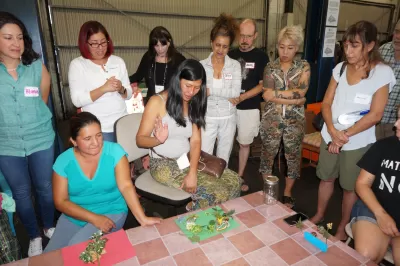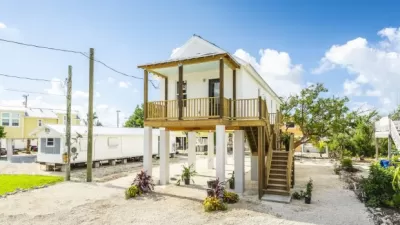Pitting the straw men of scale and community control against one another does the field more harm than good.

"This is no longer my neighborhood.”
Too often, communities of color that experience new investments report that the changes are detrimental to their lives and a benefit to newcomers, who tend to be more affluent and often predominantly white households. Residents of color can experience social and cultural alienation and a loss of political influence.
The community land trust (CLT) model attempts to address both the perception and the reality of these shifts in power and culture by placing the residents of homes located on the CLT’s land in key leadership and decision-making positions and by putting the needs of low-income residents at the center of the CLT’s mission. Importantly, most CLTs are membership based, with the membership electing the board and having direct say over land disposition.
A major debate among CLT practitioners and advocates involves the tradeoffs and tensions between "going to scale" with the housing portfolio and enacting "community control." People on one side of this debate make the case that increasing the number of homes held in trust is necessary, both for the financial sustainability of CLTs and for the production and preservation of mixed-income communities. The other side argues that ever-increasing scale may inevitably erode the community’s and local residents’ control in decision making—a vital part of the CLT governance model.
Making straw men of scale and community control and pitting them against each other does the field more harm than good. Instead, we at Grounded Solutions support reconciling and balancing the two goals to create more comprehensive CLT-based approaches that advance racial justice and inclusive community development.
Meet the Straw Men
In the debate over whether CLT practitioners and advocates should focus on community control or scale, one side says that getting too big in certain ways, especially expanding across geographies bigger than a couple of neighborhoods, is antithetical to community control. Grassroots groups taking this position tend to minimize efforts to build the resource systems and infrastructure that CLTs need to develop and grow their impact (e.g., enabling public policies, a pipeline of real estate assets, and financing) because these activities are perceived as removed from the communities the groups are trying to serve.
On the other hand groups that focus solely on scale tend to minimize community organizing and planning, resident empowerment, community ownership, and authentic place-based leadership of the CLT, often claiming that the time and processes needed to cultivate real community control are a barrier to achieving scale.
FULL STORY: Community Land Trusts: Combining Scale and Community Control

Alabama: Trump Terminates Settlements for Black Communities Harmed By Raw Sewage
Trump deemed the landmark civil rights agreement “illegal DEI and environmental justice policy.”

Study: Maui’s Plan to Convert Vacation Rentals to Long-Term Housing Could Cause Nearly $1 Billion Economic Loss
The plan would reduce visitor accommodation by 25% resulting in 1,900 jobs lost.

Planetizen Federal Action Tracker
A weekly monitor of how Trump’s orders and actions are impacting planners and planning in America.

Wind Energy on the Rise Despite Federal Policy Reversal
The Trump administration is revoking federal support for renewable energy, but demand for new projects continues unabated.

Passengers Flock to Caltrain After Electrification
The new electric trains are running faster and more reliably, leading to strong ridership growth on the Bay Area rail system.

Texas Churches Rally Behind ‘Yes in God’s Back Yard’ Legislation
Religious leaders want the state to reduce zoning regulations to streamline leasing church-owned land to housing developers.
Urban Design for Planners 1: Software Tools
This six-course series explores essential urban design concepts using open source software and equips planners with the tools they need to participate fully in the urban design process.
Planning for Universal Design
Learn the tools for implementing Universal Design in planning regulations.
Caltrans
Smith Gee Studio
Institute for Housing and Urban Development Studies (IHS)
City of Grandview
Harvard GSD Executive Education
Toledo-Lucas County Plan Commissions
Salt Lake City
NYU Wagner Graduate School of Public Service





























